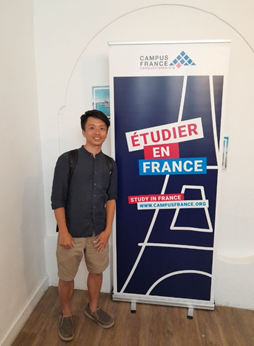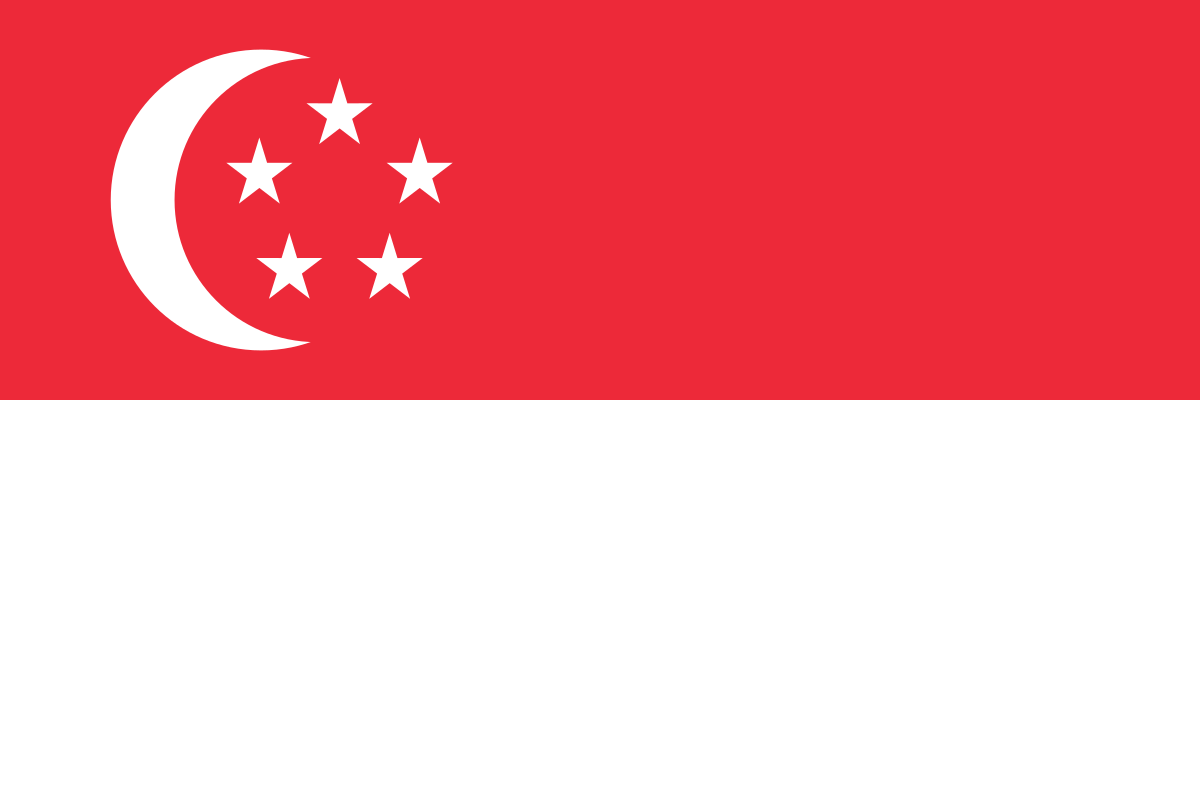French+Sciences : Interview with David Ian Santoso, Scholarship's recipient

David Ian Santoso is a year-4 student from Nanyang Business School (Accountancy and Business) at NTU who gratuaded in July 2022, and an incoming analyst at a global management consulting company. He participated in the first edition of the France Excellence Summer School Program (French+Science Programs 2022) by Campus France, sponsored by the Embassy of France in Singapore.
- Bonjour David! and congratulations for being the NTU representative for this programme! Can you tell us more on your motivation for applying to it?
Bonjour Estelle et Jean-François, merci beaucoup! Indeed, I am very pleased to have been selected by Campus France to represent NTU and Singapore for the first edition of the France Excellence Summer School Programme (Sustainability Track) in Montpellier, France.
I participated in the programme because of my strong interest in sustainable development. During my university days, I have often immersed myself in various sustainability-related experiences through internships, CCAs and academic projects. I joined this programme as I was keen to advance my passion beyond Singapore’s borders.
My main motivation was to see first-hand the good work that the French people have done in terms of renewable energy and sustainability. With Europe being at the forefront of sustainable development thinking and innovation, I believe that there is no better place to learn about the European “sustainability culture” than France – right at the heart of the continent.
Besides, I also wanted to network and be inspired by international like-minded peers. The programme invited students from all corners of the world (Africa, Middle East, Americas, Asia) and allowed me to debate on and exchange views about sustainable development – besides building friendships of course!
Finally, I was also very interested to experience living à la française. France is one of the oldest European countries with an extremely rich culture and I wanted to experience what it feels like to live in the country, and perhaps even find opportunities for possible further studies or employment.
- Did you learn French before applying to the programme?
Actually, prior to being a recipient of the programme, I would say: “Non, je ne parle pas français! (editor’s note: No, I don’t speak French).” I have never lived in a French-speaking country nor studied the language. But after having completed the programme, I regret not having taken French earlier during my studies as it is an interesting, exquisite language!
As the programme does not require the French language as a prerequisite, the participants had varying knowledge of the French language. However, we were posted to a French language school, Accent Français, which accommodates the learning needs of students at all levels. Upon arrival, we were assigned to classes that suited our respective abilities (from A0 to C1) which was comforting to me as a complete beginner.
- What is a typical day of a recipient of France Excellence Summer School Programme in Montpellier?
Among the three accommodation options offered (hostel, host family, hotel), I chose a homestay with a French family so I could better experience the local culture. Typically, I would eat breakfast with my host family in the morning, then take a leisurely walk to school (though some of my peers preferred cycling, which is popular in Montpellier). From 9 am to 12 pm, I attended daily French language lessons with other programme participants. The classes were fun and engaging due to the diversity of the students and the multitude of in-class activities that the Accent Français professeurs (editor’s note : teachers) had prepared to help us “absorb” the language as naturally as possible.
After a lunch break, we typically continued our day with sustainability lectures or site visits. We had the amazing opportunity to exclusively visit renewable energy generation plants (e.g. solar, wood), green businesses (e.g. sustainable wineries, co-operative living spaces), eco-districts, and other conferences. The activities were either held in English or French (accompanied by English translators). My favourite trip was to Réalis, an innovation hub for sustainability start-ups based in Montpellier, where I had the chance to interact with various local start-ups that are implementing new business models to promote circular economy. During the visit, we also had the chance to attend a lecture by the CEO of a nation-wide energy co-operative, where we learned about the efforts made by citizens, corporates, and the government to promote the generation and usage of green energy.
From 7 pm to 8 pm, I usually had dinner with my host family. I was lucky enough to have tasted an array of the home-made French cuisine that they had prepared for me. Despite the communication barrier, they showed me great hospitality throughout my stay for which I was very grateful.
- And in your weekends?
The school offered a wide set of options for us to visit nearby cities and historical sites. During our three weeks, we had the chance to visit Marseille (France’s key trading port and the second largest city in the country), Sète (the “Venice” of the Languedoc region in Southern France), and Carcassonne (a fortified hilltop city). We either joined the school’s guided tour or explored these places on our own. My favourite moment was when we visited Notre-Dame de la Garde, a symbolic Basilica at the top of a hill in Marseille and seeing the entire panorama of the city and its surrounding Mediterranean Sea from above low clouds.
- Any challenges you had to face during your stay?
Language was often a challenge – France is a large nation with a diversity of culture. Some parts of France are more used of international visitors and the locals are able to speak English. However, in other parts of the country, I had to be mindful and make the effort to speak decent basic French.
The weather was also more unpredictable, with searing heatwaves hitting the southern part of France (on top of the already hot Mediterranean summer). This was a solemn reminder of how real the problem of climate change is, and the need for more sustainable actions – and for me, it was also a reminder to appreciate the clouds and rains we get in Singapore!
- How did the programme support you along the way?
The organisation of the programme was superb (and quick). After my acceptance, all of us were provided with full funding for flights and train expenses (from Singapore to Paris and Montpellier), accommodation, tram tickets to get around the city, sufficient allowance to cover our living expenses for three weeks, cultural activity trips, and visa support provided by the French Embassy (for non-Singaporeans).
- Which aspects of the programme did you enjoy the most?
The sustainability aspect of the programme was highly immersive, with about 80-90% of our time spent on hands-on site visits to factories / businesses with good sustainability practices rather than merely sitting in classrooms. 14 students from my batch were selected from four countries (Singapore, UAE, Canada, Uganda), which gave an international dimension to the programme and allowed the sharing of experiences and contacts. I was very humbled by the knowledge of the speakers and my peer, and as a business student, I also enjoyed getting exposed to various technical discussions (e.g. learning how to design a solar panel).
- In which way did the programme assist you in achieving your study/ life goals?
To me, this experience opened the door for further studies: France is home to some of the world’s top business schools (e.g. HEC Paris, INSEAD, ESSEC, etc.) that I may enrol in in the future. Additionally, through this trip I have now become fond of the country – and Montpellier in particular was a beautiful, homey city – and I definitely would consider an overseas assignment or employment opportunities in France. After all, my birthday coincides with France’s National Day – perhaps that was a sign?
- Whom would you like to recommend the programme to? Any tips or advice you want to share with prospective applicants?
I would recommend this programme to everyone who wants to learn French by immersion, as well as anyone who is deeply interested in the four options of the French+Science Programs (Editor’s note: (1) Sustainability; (2) Marine Science and Technology; (3) Micro, Nano and Smart Technology, and; (4) Transport and Energy).
If, like me, you have had zero knowledge of French, you would still be welcomed to apply because French was not a prerequisite. However, it is particularly important to accumulate experiences that are relevant for the science track that you aim for. This is so that you can demonstrate your passion through your CV and application letter that may strengthen your candidacy, especially if you are aiming to secure scholarships for this programme.
To any student interested to apply for the programme from the next year onwards, I would be happy to share my tips and experience through email at dsantoso001@e.ntu.edu.sg or LinkedIn – cheers and best of luck!
Credit Picture: David Ian Santoso Interview carried out by Estelle Bech and Jean-François Ghesquière on 20 June 2022. Redaction: Estelle Bech, David Ian Santoso
|
The French+Science programme organised by Campus France is designed for international English-speaking students in sciences, who may be complete beginner in French. Any undergraduate students (bachelor’s level) seeking a period of language, scientific, and cultural immersion in France is welcome to apply. Its objectives are (1) to explore scientific and technical cutting edge sectors through site visits to companies, conferences and encounters with specialities in the fields, (2) to acquire or improve communication skills in French, and (3) to discover four of the most beautiful regions of France. The programme lasts 3 to 4 weeks and runs between June and July every year. It includes a complete academic and logistical package: French classes in the morning and visits to companies and institutes specialised in the field of choice in the afternoon. Three options are available for accommodation during the stay (university housing, host family, private apartment). Four options are currently available:
The Embassy of France in Singapore is granting several scholarships every year to fully sponsor the programmes for Singaporian students (7 scholarships awarded in 2022). Applications will open in February 2023. For further information on the scholarships’ process, you can contact us at study@ambafrance-sg.org |










